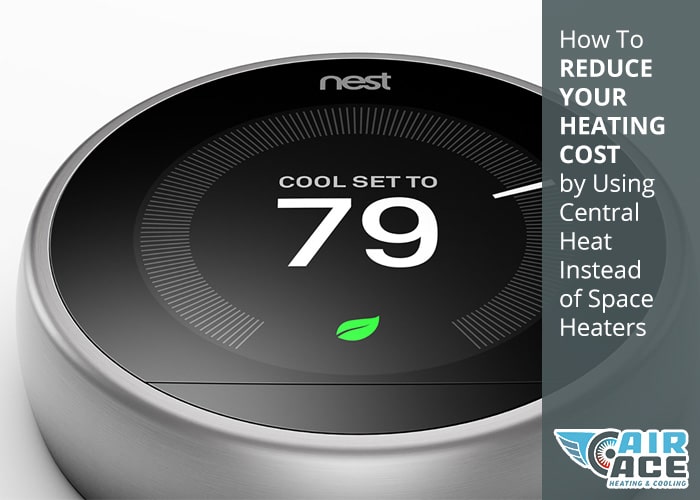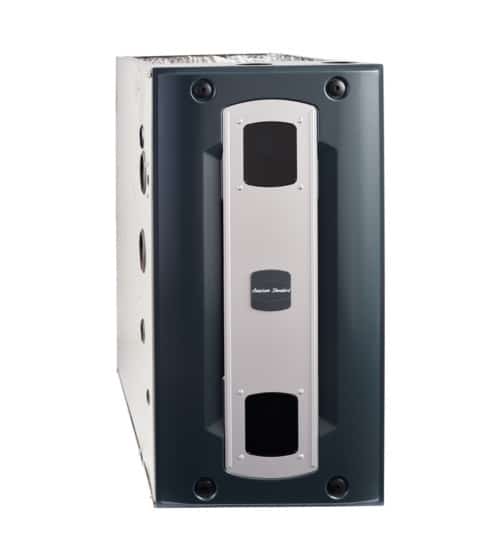How to reduce your heating cost: Space Heater vs Central Heater

Space heaters are, as their name suggests, designed to heat a small space in your home or possibly business. Many people will use them if they spend much of their time in one room or sometimes by their desks at work. They can be a great option to keep you warm, but they’re not always the most sensible choice.
Space heaters generally run on electricity, which can reduce heating cost if you’re only using one. However, if you’re using space heaters in several areas of your home, you could be wasting money, instead of saving it. It’s a common misconception that space heaters will always save you money. If you’re using several of them, central heating could be the much better option.
Looking to Reduce Heating Cost? Learn the Real Cost of Running a Space Heater
When it comes to reducing heating costs, many homeowners often wonder whether using a space heater or a central heater is more cost-effective. Both options have their pros and cons, and understanding the real cost associated with each can help you make an informed decision. Let’s take a closer look at the factors involved in running a space heater versus a central heater.
Space heaters are portable devices that provide localized heating. They are typically powered by electricity or propane. One advantage of space heaters is their lower upfront cost compared to central heaters. However, it’s essential to consider the energy consumption and operating costs over time. Space heaters tend to be less energy-efficient and may consume more electricity or fuel to generate heat. This can result in higher utility bills.
On the other hand, central heaters are integrated systems that provide heating throughout an entire home. They are often powered by natural gas, oil, or electricity. While central heaters have a higher initial investment, they are generally more energy-efficient than space heaters. Modern central heating systems come with advanced features such as programmable thermostats and zoning capabilities, allowing you to optimize energy usage and reduce costs.
Another factor to consider is insulation. Space heaters are more suitable for smaller spaces or rooms with inadequate insulation. If your home has proper insulation and you want to heat multiple rooms, a central heater is a more efficient option. Central heaters distribute warm air evenly, maintaining a consistent temperature throughout the house.
Central Heating Options
So if space heaters could end up costing you a lot of money, what are your alternatives to heat your home? Well, even using an electric central system could reduce heating cost in comparison to several space heaters. However, if you want to get maximum efficiency and save money, it’s best to explore other options. A gas furnace is a popular choice, and if you choose the right one, you can get the best efficiency for the best price. With our knowledge and expertise in gas furnaces, we can help you choose the best one for your home or business.
If you already have a gas furnace, you could be saving money right now by using it instead of turning on a space heater. Gas is the most popular choice in the Midwest and in fact in other regions with a similar climate. The areas that are deemed cold or very cold tend to favor gas over other fuels, as well as central furnaces over other heating equipment. The use of space heaters is also significant, but most people don’t use a secondary heat source – they stick to their primary method of heating instead.
There are other options to explore if you don’t want to stick with a gas furnace. If you want an efficient option, heat pumps are becoming popular. You can switch them between heating and cooling, so they’re good for the summer too. There are also renewable energy options, from ground or air-source heat pumps to solar panels, wood burners, and biofuel heating systems. When you’re thinking about what will work for your home, consider its size and your budget for installation and running it.
If you’re considering a new central heat system, you should remember that you need to pay the cost of installation too. You can make some savings on the running of your new system, but you need to think about the overall cost. If need to replace the system anyway, because it’s on its last legs, you might not worry about this so much. You need to install a new system anyway, so spending a little more doesn’t have to be a big deal. But if you’re replacing a system that still works well in the hope of saving money in the long-term, consider how long it might take to break even in savings.
How to Get the Best Energy/Fuel Deal
No matter which type of central heat system you choose, you’ll need to pay the costs of running it. Being able to find a good deal can help to ease your mind and reassure you that you’re not paying any more than you need to. When it comes to choosing your utilities, you can usually stick with the state supplier, or you can choose another energy company. Not all states have energy choice – for example, Alaska and Washington don’t – but Illinois does.
If you want to compare prices for electricity and natural gas, you can use one of a number of websites that make it quick and easy. This should help you find the best price. If you use another fuel, such as oil or wood, you will have to shop around for the best places to buy or source your fuel.
Making More from Your Heating with Insulation
Whether you choose to have a gas furnace or another heating system, you can make the most of it by changing how you use it too. Making changes to your home and to your behavior can make your use of energy more efficient. One of the things that can help you conserve energy at home is to make sure it is properly insulated. Insulating the roof, wall cavities, and other spaces helps to make sure heat doesn’t escape, and you don’t waste energy.
It’s also useful to ensure that there are no air leaks, especially around doors and windows, and in the roof. Replace weatherstripping that has worn away to ensure that it’s adequate and keeps out the cold. You could also consider double-glazed windows, which are gaining popularity in the US. They offer extra insulation for a warmer home and better protection against the elements. As an alternative, you can cover windows with plastic film.
Other Ways to Save on Central Heat
Making sure your home is well-insulated isn’t the only way you save on your central heating. Rather than turning off your heating completely and switching on some space heaters, you can try turning your thermostat down a little. If you’re walking around your home wearing only a thin T-shirt and you feel perfectly comfortable in the middle of winter, you can probably afford to adjust the temperature. Put on another layer instead, or perhaps even wrap yourself in a blanket if you’re just sitting around.
You can also turn down the heat at night or even turn it off completely if the house has warmed up through the day. It should be fairly cool in your bedroom to help you sleep, so don’t make it too warm. Even just turning down your thermostat by a couple of degrees could make a huge difference to your energy bills.
You can also save heat by stopping air from escaping inside, as well as outside. If there are large gaps underneath your doors, you could be losing air in any room. By adjusting your door thresholds, you could keep your home warm more efficiently. Sometimes, you can raise the threshold yourself, or you can use a draft excluder. Drafts can also come from the smallest places, from keyholes to electrical boxes. Covering up even tiny holes can contribute to more efficient heating.
If your home has a chimney, make sure you’re not letting warm air escape up it or cold air to get in. Close the flue when you’re not using the fireplace, to begin with. You could still be losing some heat with the flue closed, so you can also consider using a chimney balloon. These balloons blow up to give better coverage to block air going through the chimney. If you forget to take it out before using the fire, it will deflate. But it’s still a good idea to remove them because they can pick up soot and become an obstruction.
Making sure that your furnace or other heating equipment is in good working order is essential too. Start by purchasing an efficient one, then make sure you maintain it. Your furnace could benefit from a good tune-up. It’s best to have a professional hvac contractor come out and do it for you. They’ll inspect your furnace and do some preventative maintenance.
Finally, consider getting high-tech with your thermostat. Having a programmable or smart thermostat can save you a lot of money. You can program your thermostat to turn down when you’re not at home. With a smart thermostat, you can use your phone or another device to turn the heating on or off, or up and down, when you’re not even at home.
Can Space Heaters Ever Save You Money?
Now that you know that you can save money by using central heat instead of space heaters, you might be wondering if it’s ever worth using a space heater. The truth is that space heaters aren’t entirely useless for saving money, but they will only help you up to a point. Space heaters are best when you only want to heat one room or small space, either using the heater on its own or to supplement the heating you already have running.
If you want to try to make sure you save as much energy as possible, choose an energy-efficient portable heater. If you have your thermostat on, turn it down while you’re using the space heater too. And don’t forget to put on a sweater or use a blanket. Once you need to heat more than one room, it’s best to forget about using space heaters.
The Dangers of Space Heaters
Another point to keep in mind is that you shouldn’t use a space heater all the time. Ideally, you should only run it for a few hours a day. They’re not designed to be on 24 hours a day, and it could even be dangerous to have them running for too long. The most important thing is that you shouldn’t leave them unattended.
You should also make sure that they are not obstructed in any way, and that nothing is leaning on them. Space heaters can be a fire risk, causing an estimated 22,000 fires in the US each year, according to the Consumer Product Safety Commission. These fires cause around 300 deaths annually, plus thousands more injuries. If you do decide to use a space heater, you need to extra careful when you use it. Turn it off when you leave the room for a long period, go to bed, or leave your home.
Space heaters have their place in the home, but they’re not the best solution if you want to save money. Use them for one room at a time, and rely on central heating for anything else.
You might be interested to read “2 Stage vs Variable Speed Air Conditioner – Which One Should You Choose?“.
Conclusion:
To make an informed decision, consider factors like the size of your home, your heating needs, and the climate in your area. If you have a small space or want more control over heating specific areas, a space heater might be a suitable choice. However, if you need to heat larger areas or your entire home, a central heating system is likely to be more efficient and effective in the long run.
Regardless of which option you choose, it’s important to practice energy-saving habits such as proper insulation, sealing drafts, and maintaining your heating equipment. Regular maintenance and monitoring of your heating systems can help ensure optimal performance and further reduce heating costs. Consulting with a professional or conducting an energy audit can provide tailored recommendations for improving energy efficiency in your specific circumstances.


[…] the right windows and insulating materials will help in reducing your heating costs. You will need them when you require to drive out warm air from the room […]
It’s a good idea to make sure your insulation is properly installed to keep the heat from escaping. I live in an older home that gets quite cold in the winter. Checking my insulation and replacing it if necessary would likely be a beneficial step toward saving money on my heating bills.